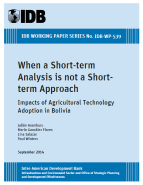The Effect of Acute and Intensive Exposure to Particulate Matter on Birth Outcomes in Montevideo
Date
Sep 2014
This study explores the impact of air pollution on adverse birth outcomes. The study focuses on the effect of breathable particulate matter with diameter of 10 micrometers or less (PM10) on the likelihood of premature birth and low birth weight (LBW). The study exploits the fact that in 2011 the ashes and dust resulting from the eruption of the Puyehue volcano in Chile substantially increased exposure to PM10 in Montevideo, Uruguay. Using prenatal and birth data from the Perinatal Information System for 2010-2012, it is found that increases in quarterly averages of PM10 concentrations beyond 50 µg/m3 decrease birth weight and increase the likelihood of LBW and prematurity at increasing rates. The results also suggest that the effect of PM10 on birth weight works mainly through a higher likelihood of prematurity, rather than through intrauterine growth retardation. The effects increase with each trimester of pregnancy: exposure during the third trimester is the most dangerous.



